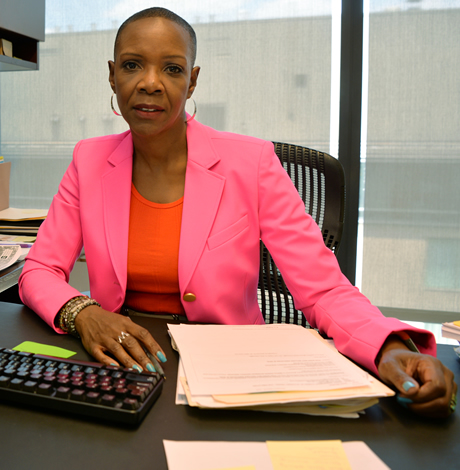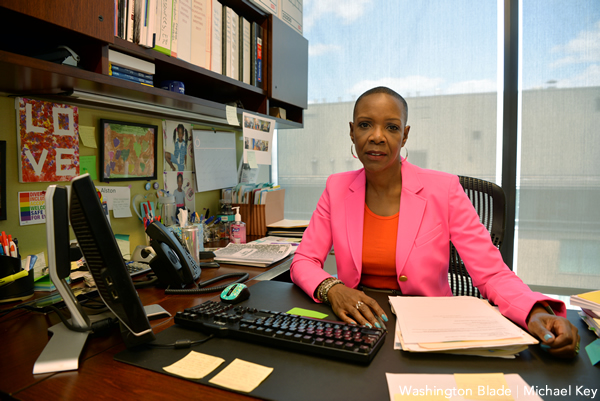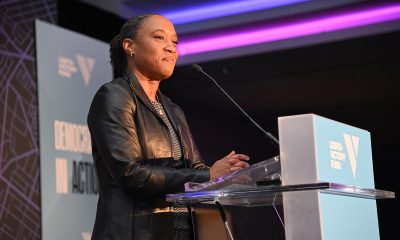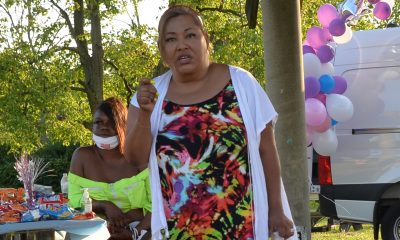Arts & Entertainment
SPOTLIGHTING LGBT HOMELESSNESS: Alston House celebrates a decade in operation
LGBT youth shelter named after slain D.C. activist


‘We are dealing with homeless youth that are isolated and rejected by the community,’ said June Crenshaw, executive director of the Wanda Alston Foundation.
This story is part of our contribution to the 2018 #DCHomelessCrisis news blitz. Local media outlets will be reporting and discussing stories about ending homelessness in the nation’s capital all day. The collaborative body of work is cataloged at dchomelesscrisis.press.
The first LGBT youth-focused shelter in D.C. is continuing its legacy of serving one of the most vulnerable demographics.
The Wanda Alston House and Foundation, now in its 10th year of service, serves LGBT individuals ages 16-24. The residential home-turned-shelter currently houses eight people, and hundreds have been through its doors over the last decade. The house is named after the late Wanda Alston, a D.C.-based LGBT activist who was murdered near her home in 2005.
Individuals enter the program based on their level of vulnerability and what kind of care the city’s homeless management providers think will best fit that person’s circumstances. The facility provides 24-hour support for residents through counseling, mental and medical health services. Tuition assistance and professional development is provided and other life skill services such as learning how to balance a checkbook, shop for groceries and manage a credit score are also offered. Residents receive three meals a day, clothing and toiletries as well as other necessities like Metro cards.
Full-time staff is trained, culturally competent and trauma-informed to ensure that all residents are supported. The operations manager and case manager work full-time at the house to make sure that everything runs smoothly and a clinical supervisor is also full-time to provide assessments and connect residents with the support they need.
The staff works together as an agency and as individuals to connect with the youths and help them cope, give support and help them navigate their lives. Sometimes that can be difficult and residents can respond by acting out.
“We are dealing with homeless youth that are isolated and rejected by the community,” says June Crenshaw, executive director of the Wanda Alston Foundation. “They’re forced to survive some unspeakable situations. Most, if not all, arrive having experienced some severe trauma. This can show up in less-than-positive ways like addiction, inability to cope with stress or not being able to navigate positive communication skills. But they’re human and they’ve had to endure circumstances that most of us couldn’t survive.”
Crenshaw, a self-identified “old-fashioned” lesbian and woman of color, says most youth in the program are women of color.
“When I started in this role two years ago, a resident came to me and said she never saw a person that looked like me in a leadership role. That stuck with me,” she says. “I’m proud to be a brown woman of the community that’s working hard to make things better.”
The program at the Wanda Alston House is slightly different from the programs at other LGBT shelters, she says. There are certain requirements that the residents must participate in that help them accomplish their personal goals within the 18-24 months they live there.
“We provide connections and care in all the ways that a person would need,” Crenshaw says.
After leaving the house, individuals stay connected to the care at the facility for 90 days-six months. Staff continues to support them however they need it — like buying groceries, clothes or Metro cards and finding housing and employment as well as providing case management to help them navigate other support and services available.
Crenshaw says there’s an “epidemic of LGBT homelessness.” Around 50 percent of the homeless youth in D.C. are LGBT-identifying. At the Wanda Alston House, residents “talk and share experiences around being treated differently, misgendered, disrespected, attacked and discriminated against.”
She says the city is committed to the youth but that in homeless centers that are not culturally sensitive to LGBT people, “grave mistreatments” can occur.
“Our population is trending as the most affected by homelessness and mental health issues,” she says. “We have a responsibility to do better by our youth, make sure they stay safe and are allowed to thrive. Facilities like ours are needed as long as these circumstances exist.”
The facility costs slightly over half a million dollars to run each year and most comes from local government offices such as the Mayor’s Office of LGBT Affairs. Grant dollars are used to run the shelter and pay staff, but that doesn’t cover all the expenses. They also rely on fundraising and the LGBT community and allies to support them. Donations amount to 25 percent of the budget.
Although D.C. has some of the most progressive laws in the nation and has been widely noted as one of the U.S. cities LGBT individuals can feel most open and supported, the competitive job market and high cost of living creates difficulties for LGBT people. LGBT people of color are more likely to be unemployed and represent a large portion of impoverished individuals and victims, Crenshaw says.
D.C. has the highest number per capita of LGBT individuals compared to other American cities. Crenshaw says not enough of the resources the city provides for homeless people are going to LGBT organizations and there is a lot of work yet to be done to resolve this epidemic.
The Wanda Alston House, however, has survived the turbulence of 10 years of operation and Crenshaw says they are ready and looking forward to at least another 10.
Theater
‘Amm(i)gone’ explores family, queerness, and faith
A ‘fully autobiographical’ work from out artist Adil Mansoor

‘Amm(i)gone’
Thorough May 12
Woolly Mammoth Theatre
641 D St., N.W.
$60-$70
Woollymammoth.net
“Fully and utterly autobiographical.” That’s how Adil Mansoor describes “Amm(i)gone,” his one-man work currently playing at Woolly Mammoth Theatre.
Both created and performed by out artist Mansoor, it’s his story about inviting his Pakistani mother to translate Sophocles’s Greek tragedy “Antigone” into Urdu. Throughout the journey, there’s an exploration of family, queerness, and faith,as well as references to teachings from the Quran, and audio conversations with his Muslim mother.
Mansoor, 38, grew up in the suburbs of Chicago and is now based in Pittsburgh where he’s a busy theater maker. He’s also the founding member of Pittsburgh’s Hatch Arts Collective and the former artistic director of Dreams of Hope, an LGBTQ youth arts organization.
WASHINGTON BLADE: What spurred you to create “Amm(i)gone”?
ADIL MANSOOR: I was reading a translation of “Antigone” a few years back and found myself emotionally overwhelmed. A Theban princess buries her brother knowing it will cost her, her own life. It’s about a person for whom all aspirations are in the afterlife. And what does that do to the living when all of your hopes and dreams have to be reserved for the afterlife?
I found grant funding to pay my mom to do the translation. I wanted to engage in learning. I wanted to share theater but especially this ancient tragedy. My mother appreciated the characters were struggling between loving one another and their beliefs.
BLADE: Are you more director than actor?
MANSOOR: I’m primarily a director with an MFA in directing from Carnegie Mellon. I wrote, directed, and performed in this show, and had been working on it for four years. I’ve done different versions including Zoom. Woolly’s is a new production with the same team who’ve been involved since the beginning.
I love solo performance. I’ve produced and now teach solo performance and believe in its power. And I definitely lean toward “performance” and I haven’t “acted” since I was in college. I feel good on stage. I was a tour guide and do a lot of public speaking. I enjoy the attention.
BLADE: Describe your mom.
MANSOOR: My mom is a wonderfully devout Muslim, single mother, social worker who discovered my queerness on Google. And she prays for me.
She and I are similar, the way we look at things, the way we laugh. But different too. And those are among the questions I ask in this show. Our relationship is both beautiful and complicated.
BLADE: So, you weren’t exactly hiding your sexuality?
MANSOOR: In my mid-20s, I took time to talk with friends about our being queer with relation to our careers. My sexuality is essential to the work. As the artistic director at Dreams of Hope, part of the work was to model what it means to be public. If I’m in a room with queer and trans teenagers, part of what I’m doing is modeling queer adulthood. The way they see me in the world is part of what I’m putting out there. And I want that to be expansive and full.
So much of my work involves fundraising and being a face in schools. Being out is about making safe space for queer young folks.
BLADE: Have you encountered much Islamophobia?
MANSOOR: When 9/11 happened, I was a sophomore in high school, so yes. I faced a lot then and now. I’ve been egged on the street in the last four months. I see it in the classroom. It shows up in all sorts of ways.
BLADE: What prompted you to lead your creative life in Pittsburgh?
MANSOOR: I’ve been here for 14 years. I breathe with ease in Pittsburgh. The hills and the valleys and the rust of the city do something to me. It’s beautiful, it’ affordable, and there is support for local artists. There’s a lot of opportunity.
Still, the plan was to move to New York in September of 2020 but that was cancelled. Then the pandemic showed me that I could live in Pittsburgh and still have a nationally viable career.
BLADE: What are you trying to achieve with “Amm(i)gone”?
MANSOOR: What I’m sharing in the show is so very specific but I hear people from other backgrounds say I totally see my mom in that. My partner is Catholic and we share so much in relation to this.
I hope the work is embracing the fullness of queerness and how means so many things. And I hope the show makes audiences want to call their parents or squeeze their partners.
Out & About
The Rare Book Fair is coming to D.C.
Over 35 antiquarian booksellers from across the country to attend

The Capital Rare Book Fair will bring more than 35 antiquarian booksellers from across the country to D.C. from Friday, May 3 to Sunday, May 5 at the historic University Club at 1135 16th St., N.W.
This year, the fair will take over two floors in the illustrious mansion on 16th Street and showcase thousands of beautiful, notable, and rare books, maps, and historic documents from around the globe. Exceptional examples that will be offered include leaf 27 of a 40-leaf xylographic Biblia pauperum, a picture Bible from 1465 for $85,000 from Bruce McKittrick Rare Books, among many other intriguing selections.
Tickets are $50 and more information is available on the event’s website.

Friday, April 19
Center Aging Friday Tea Time will be at 2 p.m. on Zoom. This is a social hour for older LGBTQ adults. Guests are encouraged to bring a beverage of choice. For more information, email [email protected].
Go Gay DC will host “Drag Pageant” at 8 p.m. at Freddie’s Beach Bar and Restaurant. Net proceeds from this event will benefit EQUALITY NoVa, the local nonprofit organization dedicated to advancing equality in Northern Virginia. Attendance is free and more details are available on Eventbrite.
Saturday, April 20
LGBTQ People of Color Support Group will be at 1 p.m. on Zoom. This peer support group is an outlet for LGBTQ People of Color to come together and talk about anything affecting them in a space that strives to be safe and judgment free. For more details, visit thedccenter.org/poc or facebook.com/centerpoc.
Go Gay DC will host “LGBTQ+ Brunch” at 11 a.m. at Freddie’s Beach Bar & Restaurant. This fun weekly event brings the DMV area LGBTQ community, including allies, together for delicious food and conversation. Attendance is free and more details are available on Eventbrite.
Sunday, April 21
Go Gay DC will host “LGBTQ+ Dinner” at 7 p.m. at Federico Ristorante Italiano. Attendance is free and more details are available on Eventbrite.
AfroCode DC will be at 4 p.m. at Decades DC. This event will be an experience of non-stop music, dancing, and good vibes and a crossover of genres and a fusion of cultures. Tickets cost $40 and can be purchased on Eventbrite.
Monday, April 22
Center Aging: Monday Coffee & Conversation will be at 10 a.m. on Zoom. This is a social hour for older LGBTQ adults. Guests are encouraged to bring a beverage of their choice. For more details, email [email protected].
Tuesday, April 23
Pride on the Patio Events will host “LGBTQ Social Mixer” at 5:30 p.m. at Showroom. Dress is casual, fancy, or comfortable. Guests are encouraged to bring their most authentic self to chat, laugh, and get a little crazy. Admission is free and more details are on Eventbrite.
Genderqueer DC will be at 7 p.m. on Zoom. This is a support group for people who identify outside of the gender binary. Whether you’re bigender, agender, genderfluid, or just know that you’re not 100% cis. For more details, visit genderqueerdc.org or Facebook.
Wednesday, April 24
Job Club will be at 6 p.m. on Zoom. This is a weekly job support program to help job entrants and seekers, including the long-term unemployed, improve self-confidence, motivation, resilience and productivity for effective job searches and networking — allowing participants to move away from being merely “applicants” toward being “candidates.” For more information, email [email protected] or visit [email protected].
Asexual and Aromantic Group will be at 7 p.m. on Zoom. This is a space where people who are questioning this aspect of their identity or those who identify as asexual and/or aromantic can come together, share stories and experiences, and discuss various topics. For more details, email [email protected].
Thursday, April 25
The DC Center’s Fresh Produce Program will be held all day at the DC Center for the LGBT Community. People will be informed on Wednesday at 5:00 pm if they are picked to receive a produce box. No proof of residency or income is required. For more information, email [email protected] or call 202-682-2245.
Virtual Yoga with Charles M. will be at 7 p.m. on Zoom. This is a free weekly class focusing on yoga, breath work, and meditation. For more details, visit the DC Center for the LGBT Community’s website.
-

 District of Columbia2 days ago
District of Columbia2 days agoReenactment of first gay rights picket at White House draws interest of tourists
-

 District of Columbia2 days ago
District of Columbia2 days agoNew D.C. LGBTQ+ bar Crush set to open April 19
-

 Arizona2 days ago
Arizona2 days agoAriz. governor vetoes anti-transgender, Ten Commandments bill
-

 Africa4 days ago
Africa4 days agoUgandan activists appeal ruling that upheld Anti-Homosexuality Act












